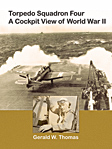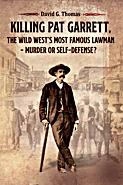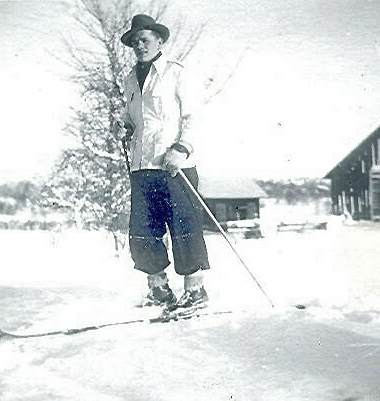|
|
||||||||||||||||||||||||
 |
||||||||||||||||||||||||
|
|
||||||||||||||||||||||||
|
||||||||||||||||||||||||
|
|
||||||||||||||||||||||||
 |
||||||||||||||||||||||||
 |
||||||||||||||||||||||||
 |
||||||||||||||||||||||||
|
|
||||||||||||||||||||||||
|
|
An Amateur Astronomer in the German Army |
|
By Franz Graetsch |
|
The Skramstad departs from port of Trondheim on October 3, 1943 under a brilliant sun, pulled by tugboats. Outside the narrows, the tugboats turn away and the ship's motor starts growling. The glittering sea is as calm as a mirror. I am enjoying the spectacle of the slowly receding coastline when a sudden explosion under the poop deck throws up a huge water fountain. The men manning the 2 centimeter anti-aircraft guns at the stern swing their canons around as if attacked. They are shook up, and so am I.
The trip continues and we experience the beauty of the Fjords. The high mountains and steep walls, often close to the ship, are a fascinating experience for me, a city slicker from the big city of Essen. Although it is very warm below deck, it is a rather pleasant trip. We have ample supplies of smoked sausage, ersatz honey in pink Bakelite boxes, margarine, and sour dough bread. And I have plenty of time to study my constant companion, the thick astronomy book from the library in Essen. I'm especially fascinated by the quote from the Bible in the book where the stars are mentioned, Job 38:31: "Can you bind the chains of the Pleiades, or loose the cords of Orion?" At that time they had only a vague notion that within the Pleiades the stars flee from each other while in Orion they do not. Nowadays we know that, of course. The night comes upon us and to the west I can see the circumpolar constellation of Orion. Two comrades join me on deck to learn more about the stars. They have already experienced how useful astronomy can be when one night in Denmark I'd located our barracks using the Polar Star. We also talk about our comrades in the bow of the ship. "They have a leather behind, so they must be from the 'Mounted Mountain Navy,'" says one of them. When I ask how this expression started, they tell me that as far back as 1939 the expression was being used to describe people considered not fit to serve in the armed forces. They didn't know if a "Mounted Mountain Navy" really existed, but I had met a soldier of the Special Mountain Brigades at Moss who was on his way home on furlough and who had been in the battle of Narvik. He told me how 10 German destroyers were sunk by the British. Most of the Navy personnel were rescued, almost 2000 men. But what to do with them? No one knew, so they were incorporated in supply units. They now belonged to the Special Mountain Brigades and they were riding a mule. This stupid war had in this way originated the expression "Mounted Mountain Navy." Well, we think it's interesting to know, as we are bound for that part of the world. In this way the evening passes and I am looking forward to the next day. Of course, one never knows what the future holds.... The Air Attack on the Skramstad It is October 4, a beautiful morning, with splendid, clear weather and lots of sunshine. We are all below deck, having had our coffee and food already. Because it is so hot, we are not wearing our uniforms. We are in shirt-sleeves and most of us are laying around on our cots and dozing. The time approaches for lunch. Suddenly an alarm -- an airplane attack. Hectic flak activity. We hear boots trampling on the iron deck above us, as the men there haul more ammunition to their battery. For a moment everything is quiet -- even silent. But the motors of the ship rev up, making more noise and trembling even more than before. Then, the attack starts. Volleys of the 2 centimeter flak, first in short bursts, then in longer volleys, which evoke in me memories of the air war over my home town of Essen. Through the open hatch, on an angle to the back, I suddenly see tracers of the flak projectiles low to the earth. That warns me that we are under attack and I jump to find cover somewhere. A hailstorm of hits strike the outer shell of the ship and explosions close by show me it is getting serious. I try to hide behind a pile of ship's accessories as a hissing sound passes by my ear, over my shoulder, and impacts into a pile of wooden boards behind me. Then, it is over, but I certainly do not feel safe. Seconds later there is a huge explosion which causes a gigantic tremor. The locked door in the wooden bulkhead next to me flies open because of the pressure of the explosion. Simultaneously, I am hit by the foul stench of gases and smoke. The door stands wide open in my direction and I see to my utter horror a comrade laying on the ground, maybe 60 to 70 centimeters away, surrounded by boards and burning straw. His left eye is hanging from its socket and his blond hair is on fire. Douse the fire, douse it! There is no time to think. Since the tension has suddenly made it necessary for me to urinate, I simply urinate on his head. I'm not at all ashamed to report this. I succeed in putting the fire in his hair out, but parts of his shirt are still burning, as is everything in the compartment. It's an inferno. A comrade comes to help and we succeed in dragging the wounded man out. It is awful with that eye; however, he is alive. Other soldiers carry him away from the door and from our compartment where the flames and the heat makes it intolerable. The flak suddenly stops. I am the first to leap up the wooden stairway to the deck. There I see three airplanes flying off in a westerly direction. The one in the middle definitely has been hit by flak. It was apparently hit in the cooling system. The trailing plume is a glistering black and it doesn't look like the fuel fires I saw shooting from planes hit by flak in 1942. I had been in the rear compartment, close to the flak battery, when the bomb burst through the hatches. Water hoses are deployed and I help to fight the fire. On the stairway that leads downward we see a dead comrade. He is being floated down by the powerful water canon. But nothing seems to help. The Skramstad keeps burning, so she is beached on an nearby island. The call is "save yourselves." The flak ammunition is starting to explode. Everybody runs for safety. Because I am hardened through the air attacks on Essen, this isn't a "big deal" to me. I keep calm. I go to the fore compartment where the comrades have left in great haste and have dropped everything. They are probably soldiers of the cavalry with their "leather seat." I take a uniform that is much too big for me - but what the heck. I pick up three cavalry saddle packs, fill them up with sausage, bread, and margarine, and swing a blanket around my shoulders, Cossack style, with a belt around the middle. Only then do I leave the ship as almost the last man. Just as I climb down the rope ladder, the flak cuts lose again. But this time, it isn't an enemy plane that has been sighted. It's a Junkers 88, which fires a signal shot, stopping the flak. Loaded with the heavy packs I later visit the comrades of our group and share my booty with them. No one has a knife, but a stone to spread the margarine works quite well. That same evening, as the Skramstad burns in the distance, we are picked up by a Norwegian coastal ship and sail in the direction of Bodø. That night, I sleep in a cabin together with another comrade. I write a voucher with the heading: 4 Oct 1943 Infantryman Franz Graetsch, 3 Comp. 199 Div. Notes: 1. For another survivor´s account of the attack on the Skramstad, see We Survived by Bernhard A. E. Nolte. 2. For an analysis of the German report of the strike, see Operation Leader: The German View. 3. For a pilot´s account of OPERATION LEADER, see "Operation Leader: Initiation Over Norway" in Torpedo Squadron Four: A Cockpit View of World War II. 4. In 1993 and 2001, Ranger veterans returned to Norway to attend memorials for the men lost in OPERATION LEADER. See Norway: A Grateful Nation Remembers and USS Ranger Veterans Return To Norway. |
|
|
Air Group 4 - "Casablanca to Tokyo" |
|||
|
|
|||
